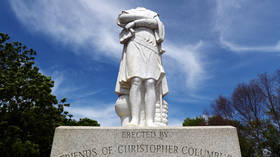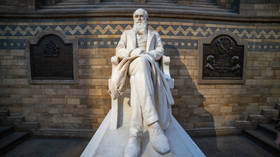‘Information heroes’?! Reporters Without Borders hails White House press corps for pandemic coverage
Reporters Without Borders (RSF) has praised journalists who distinguished themselves with courageous work on the Covid-19 pandemic – whistleblowers and reporters who were jailed and persecuted – and the White House press corps.
The press organization published a list of 30 “information heroes” whose “courage, perseverance or capacity to innovate has helped to circulate reliable and vital information” during the coronavirus outbreak which has infected close to eight million people worldwide as of Monday.
Among the jailed and persecuted whistleblowers, suppressed media outlets, and courageous truth-tellers who endured real adversity in their efforts to cover the pandemic, the decision to include the entire White House Correspondents’ Association raised a few eyebrows.
Fake News Rewards Themselves With Undeserved Praise! White House reporters hailed as ‘information heroes’ https://t.co/sB3hA7im8r
— David, Ph.D. (@americanshomer) June 15, 2020
"White House reporters hailed as information heroes, by other White House reporters, and blue-check mark Twitter"
— MichelleLeigh🇺🇸 (@B0mbChe11e) June 15, 2020
Citing “sarcasm and scorn … and even insults” from President Donald Trump and his aides – who “systematically questioned” the reporters’ “integrity and competence” – as examples of the adversity faced by the intrepid chair-warmers, RSF sang the praises of the entire press corps. It also singled out a few – CBS’ Weijia Jiang and Paula Reid, NBC’s Peter Alexander, and Fox News’ Kristin Fisher – for special adulation.
Jiang was infamously told by the president to “ask China” in response to a question about why he was treating the pandemic like a competition, while Reid was called “disgraceful” for accusing Trump of wasting the preparation time he’d supposedly “bought” with travel restrictions in the early days of the epidemic, instead of preparing hospitals or expanding testing capabilities. Alexander was denounced as a “terrible reporter” after questioning whether Trump was giving Americans a “false sense of hope” by touting experimental drugs as potential Covid-19 cures, while Fisher was chewed out for criticizing the federal government’s ongoing failure to deliver quick test results.
Also on rt.com ‘Really bad reporting!’: Trump slams NBC reporter (& soon-to-be #Resistance hero) over coronavirus ‘sensationalism’However, dime-a-dozen Trumpian insults hardly measured up to the six-month jail sentence Indian reporter Vijay Vineet was threatened with for reporting that hungry children from the ‘Dalit’ (untouchable) class were reduced to eating cattle feed due to lockdown restrictions, or the potential life sentence dangling over Bangladesh cartoonist Ahmed Kabir Kishore for supposedly hinting at government corruption in his ‘Life in the Time of Corona’ series.
RSF’s list was clearly skewed in favor of US foreign policy, with China, Iran, and Venezuela held up as press-freedom-hating bogeymen for supposedly repressing the included journalists. Chinese writer Fang Fang – who chronicled the Wuhan hospital system’s alleged “collapse” on her Weibo diary for western readers looking for proof of Beijing’s imminent demise – got a nod, overcoming supposed harassment by government-funded trolls to publish a book comprised of her diary entries.
Also included on the ‘evil China’ shortlist was Wuhan Central Hospital doctor Li Wenliang, questioned for “spreading false rumors” over his early warnings about the coronavirus before dying – of the virus, not government repression – in February; and Chris Buckley, a New York Times foreign correspondent whose visa was not renewed after 76 days spent reporting from Wuhan.
Unmentioned in Buckley’s mini-hagiography is the US-China journalistic feud that was underway at the time, which saw Beijing refusing to renew American journalists’ visas in response to the US State Department tightening its own restrictions on the number of Chinese journalists permitted to work in the country.
Also on rt.com ‘Reciprocal measures’: Beijing tells NYT, WSJ, WaPo journalists to hand in credentials as US-China media war rolls onA Russian network of 25 independent outlets called Syndicate-100 was also included, praised for providing an anonymous whistleblowing platform for medical personnel concerned about a lack of PPE.
Like this story? Share it with a friend!















